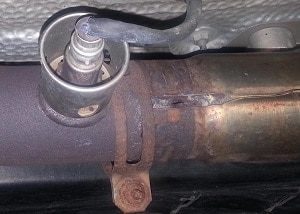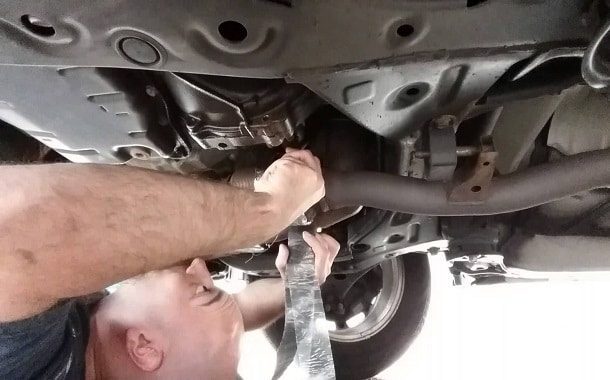How Much Does an Exhaust Leak Repair Cost?
Last Updated on February 4, 2024
Written by CPA Alec Pow | Content Reviewed by ![]() CFA Alexander Popinker
CFA Alexander Popinker
An exhaust leak can seriously impact your vehicle’s performance and safety. But how much does it actually cost to repair exhaust leaks? This article will break down average exhaust leak repair costs, factors that influence pricing, when to repair vs replace your exhaust system, and tips for choosing a quality mechanic. Read on to learn why addressing exhaust leaks promptly can save you money in the long run.
An exhaust leak occurs when there are cracks or holes in the exhaust pipes, muffler, manifold, or gaskets. This allows exhaust fumes to escape before being expelled from the tailpipe.
Signs of an exhaust leak include a loud rumbling noise from under the vehicle, smelling exhaust fumes inside the car, poor fuel economy, and failure of an emissions test. Ignoring exhaust leaks can lead to carbon monoxide poisoning, increased engine wear, and potentially costly damages.
How Much Does an Exhaust Leak Repair Cost?
The average cost to repair minor exhaust leaks is $200 to $600, while more extensive repairs average $600 to $1,200. Labor accounts for much of this cost, with mechanics charging $65 to $150 per hour or more for exhaust repairs.
Parts like pipes and mufflers add on top. Additional costs like shop fees and taxes can bring the total even higher.
Here are average repair costs for some common exhaust issues:
- Small exhaust leaks – $200 to $350 for welding cracked pipes or replacing flanges/gaskets.
- Muffler repairs – $350 to $850 to patch holes or completely replace the muffler.
- Tailpipe repairs – $300 to $500 to replace broken or rusted tailpipes.
- Exhaust manifold repairs – $400 to $900 for replacing cracked or warped manifolds.
- Full exhaust system replacement – $800 to $1,500 or more, depending on the car’s make and model. Luxury vehicles can cost $3,000 or more.
Additional costs: Shop supplies, taxes, catalytic converter replacements, and custom fabrication for older or rare vehicles can all raise exhaust repair bills. Diagnostic fees of $100 to $200 are common to find the exact location of leaks.
WhoCanFixMyCar.com, for example, writes that the average cost of exhaust repairs for popular vehicle makes ranges from £96.10 to £118.99.
CoPilotSearch notes that the cost to fix an exhaust leak can range from as little as $30 to as much as $400, depending on the severity of the leak.
According to CarsDirect, most independent shops charge around $80 to $90 an hour for labor, resulting in a labor cost between $160 and $270. At a dealership, with a labor rate of approximately $110 an hour, the labor bill can range from $220 to $330. The cost of the replacement gasket will vary depending on the make of the vehicle.
SpeedAlternators.com reports that the cost to repair a broken exhaust pipe at a muffler shop can range from $100 to $500 or more.
How to Spend Less on Exhaust Leak Repairs
While exhaust work is rarely cheap, you can save money on leak repairs by:
- Shopping around for quotes – prices can vary widely between mechanics.
- Choosing more affordable mufflers or pipes over OEM parts. Aftermarket or used parts tend to cost less.
- Having multiple issues fixed at once rather than separate visits.
- Asking your mechanic about getting factory defect warranties on some exhaust components.
- Fixing leaks as soon as possible before they worsen and require more extensive repairs.
Diagnosing an Exhaust Leak
Mechanics use a combination of visual inspection and audio tests to diagnose exhaust leaks. First, they will put the car up on a lift to examine the entire exhaust system from manifold to tailpipe. Signs of leaks include rust, damage, loose parts, and carbon buildup.
Next, the mechanic will rev the engine and use tools like endoscopes and stethoscopes to listen for the high-pitched hissing or rumbling that indicates a leak. Smoke tests are another common method – mechanics pump artificial smoke into the tailpipe and watch for where it escapes.
If you suspect an exhaust leak yourself, be sure to have it professionally inspected for an accurate diagnosis. Attempting makeshift repairs often makes the problem worse.
Factors that Influence Exhaust Leak Repair Cost
Several key factors determine how much you will pay to fix an exhaust leak:
- Location of the leak – Small leaks in accessible pipes are cheaper to weld or patch than leaks in hard to reach spots requiring disassembly.
- Extent of damage – Pinholes can be welded for $100 to $300, but large sections of corroded, crushed, or cracked pipes may need replacing at $500 or more.
- Vehicle make and model – Luxury and imported vehicles typically have more expensive parts and labor rates.
- Repair shop rates – Dealerships and specialized shops charge more than independent mechanics. Shop rates range from $70 to $150+ per hour.
- Use of OEM vs. aftermarket parts – Original manufacturer parts are often 2x the cost of aftermarket alternatives.
- Number of parts that need to be replaced – The more parts, the higher the complete repair bill.
When to Repair vs. Replace Your Exhaust System
For minor leaks and surface rust, repairs are often sufficient. But once the exhaust system is extremely corroded or damaged, replacement becomes the better option. Here are signs it’s time to replace your exhaust:
- Multiple leaks along the system
- Large sections of pipe or muffler rusted through or crushed
- Frequent breakage of exhaust components
- Failed emissions tests after repairs
- Lack of OEM replacement parts due to vehicle age
In these cases, you’ll need to weigh the costs. Exhaust repairs average $500 to $1,000. Meanwhile, replacing the entire system often runs $800 to $1,500 or more. Replacing only the noisy or damaged sections is sometimes possible for less than full replacement. Talk to your mechanic about the most cost-effective solution for your vehicle.
Did you read our articles about the cost of car exhaust installation, flex pipe repair, and muffler delete?
Choosing a Quality Exhaust Repair Shop
The right repair shop will diagnose issues accurately, make warranted repairs, and charge fair labor rates. Here’s how to choose a good exhaust mechanic:
- Check reviews and ask for references to verify quality work.
- Look for ASE certified technicians with experience in exhaust repairs.
- Compare estimates from multiple shops before deciding.
- Choose an exhaust specialist for extensive repairs over general mechanics.
- Ask about warranties on parts and labor.
- Inquire about options for OEM, aftermarket, and used parts.
- Look for transparent diagnosis fees and hourly labor rates.
- Make sure the shop has the proper equipment like lifts and welding gear.
A bit of research will help you find the right shop to fix your exhaust leak at a competitive price.
Preventing Future Exhaust Leaks
 While exhaust system corrosion and damage is largely unavoidable over time, you can prolong the life of your exhaust and avoid leaks with proper maintenance:
While exhaust system corrosion and damage is largely unavoidable over time, you can prolong the life of your exhaust and avoid leaks with proper maintenance:
- Get oil leaks fixed ASAP to prevent exhaust rust.
- Inspect the exhaust each time you change your oil. Look for rust spots or loose parts.
- Have mechanics check the exhaust system during routine visits.
- Replace oxygen sensors as recommended to keep exhaust emissions optimal.
- Use high-quality exhaust components when repairs are needed. Avoid “cheap” mufflers prone to rust.
- Wash the undercarriage regularly, especially in winter climates where salt is used on roads.
Performing preventative maintenance and addressing problems early is key to minimizing exhaust leaks and associated repair costs.
Final Words
Exhaust leaks should never be ignored. Letting them go can lead to decreased performance, costly damage, and dangerous exhaust fumes entering your vehicle.
Typical minor repairs average $200 to $600, while extensive replacements can exceed $1,000. Factors like location, damage extent, vehicle type, and shop rates all impact cost.
Stay proactive with maintenance and shop around for quotes to find quality exhaust leak repairs at a fair price. Addressing issues promptly will save you money and trouble down the road.
Frequently Asked Questions
Is it OK to drive with an exhaust leak?
No, it is not recommended to drive with an exhaust leak. Even small leaks allow harmful fumes like carbon monoxide to enter the cabin. Prolonged exposure can cause poisoning, fatigue, headache, nausea, and other symptoms.
Larger leaks will greatly impact performance too. Have any leaks fixed promptly by a mechanic to ensure safety. Only drive straight to the shop if absolutely necessary.
How serious is an exhaust leak?
Exhaust leaks should always be taken seriously and repaired as soon as possible. Large leaks can lead to carbon monoxide filling the cabin, which is extremely dangerous.
Even minor leaks reduce performance, waste fuel, and allow engine heat to damage other components. Leaks always worsen over time when left unattended. It’s crucial to diagnose and repair any potential leaks before extensive damages occur.
Are exhaust leaks easy to fix?
Some minor exhaust leaks can be easy, quick fixes for a mechanic, such as tightening flanges or welding small holes. But extensive leaks requiring pipe replacements or muffler repairs take more time and work to properly diagnose and fix.
Exhaust components are usually buried underneath the vehicle, making access tricky. And removing rusted parts can sometimes be very difficult. For severe exhaust damage, repairs may not always be possible, necessitating full system replacement. So while some leaks are simple, others can be quite labor-intensive.


Leave a Reply
Want to join the discussion?Feel free to contribute!